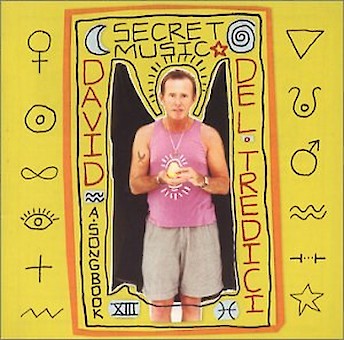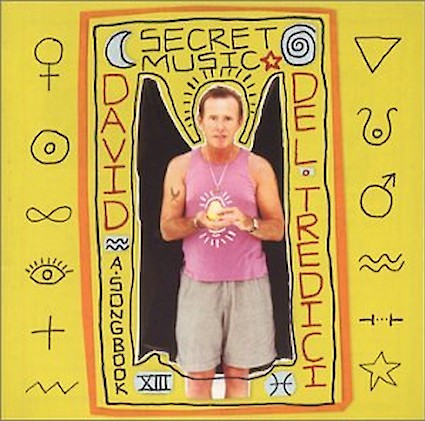Brother's eight songs include four poems by John Kelly – poetry that captures so well a gay man's pursuit of love, sex and connection in a big "metal" city. Poignantly evoked are the loneliness of dark bars, backrooms and baths, ... the sudden bright light of connection to an "ardent" reciprocating partner, ... and the pains of geographical separation ("soon to be 3000 miles away") and of memory ("This solid ground warps under the memory of you").
A love so relentlessly self-centered seems to illuminate only the author, while the partners, often shifting, remain in shadow. Perhaps the obsessive first song ("I I I I I") encapsulates this quality most succinctly. And (speaking of self-centeredness) towards the end of the last song, "Brother," I "sign" my own name, i.e., the baritone counts, in Italian, from one (uno) to 13 (tredici).
Complementing and contrasting with his own, Kelly has chosen four more poems. "Personals Ad" (by Allen Ginsberg) is ? in its funny and graphic detail ? just that: a newspaper advertisement of available self. Paul Monette's "Here," in contrast, is a searing, graveside lament ("everything extraneous has burned away") over the loss of a partner to AIDS. Jaime Manrique's "Matthew Shepard" elegizes the young man whose long, slow death, tied to a Wyoming fence, confronted the nation with perhaps its starkest example of late-20th-century homophobia. The poem focuses upon that ecstatic moment when Matthew Shepard's soul leaves his pain-wracked body and "ascends." By contrast, Lewis Carroll's "Alice"-inspired "Acrostic Song" relieves the somber mood. Victorian words of rapture, tinged only slightly with regret, recall the poet's blissful boating trips up the Thames with the three enchanting Liddell sisters. The first letter of each line spells out acrostically the name of the real-life Alice ? Alice Pleasance Liddell ? for whom Carroll wrote his famous stories and collected them together under the title, Alice's Adventures in Wonderland.
At the end of the work, Kelly's title-song, "Brother," brings us back to a much grittier world than that of the Liddell sisters ? a real world where connection and love are inevitably burdened by countervailing forces.
Midway through the performance, Kelly sings Paul Monette's poem, "Here," the inaugural poem of Monette's heartwrenching 1988 collection of poems, Love Alone: 18 Elegies For Rog, written shortly after the deat of his lover, Roger Horowitz, in 1986. "Here" is about loss and survival. Paul begins the mourning process even before Rog dies. Midway through the poem, Monette writes the following:
oh sweetie will you please forgive me thisthat every time I opened a box of anything Glad Bags One-A-Days KINGSIZE was the worst I'd think will you still be here when the box is empty Rog Rog who will play boy with me now that I bucket with tears through it all when I'd cling beside you sobbing you'd shrug it off with the quietest I'm still hereThe poem, which continues for another ten lines, is like all other in teh collection, unpunctuated. Monette wanted to capture the rawness and incomprehensibility of his emotions during Roger's illness. Monette leaves a record of Roger's voice in the poem, which becomes, after MOnette's own death in 1995, the poet's own. They are both stil here in the poem itself. Kelly very effectively brings voice to both these men in his beautiful rendition of "Here," a moving act of testimony to all those lost to AIDS and an acknowledgement of those left behind. Someone, the poem suggests, is always still here. Someone moves forward and bears witness to the lives lost. the poem — like the song in Kelly's performance — showcases the role of the arts in response to AIDS and foregrounds this role as an ongoing necessity that continues twenty years into the epidemic. In the preface ot the collection, Monette insists that he "would rather have this volume filed under AIDS than under Poetry, because if these words speak to anyone they are for those who are mad with loss, to let them know they are not alone." Kelly and Del Tredici honor this sentiment and recirculate it for out time.
But one work really polarized the audience: David Del Tredici's "This SOlid Ground," a group of songs-in-progress, which were heart-stoppingly exposed and lush, and sung with arresting, raw, and nakedly nonclassical voice by John Kelly, a performance artist. A critic sitting next to me gasped and refused to applaud. Here was something new and bold, meticulously wrought and quite surprising — qualities that excited me in Cage, Feldman and Mr. Stockhausen, but which "Great Day in New York," despite the celebration, mostly didn't have.
Del Tredici showed uncommon sensitivity and creativity in songs that constantly tapped at the heart's door.
"These songs-often quirky, sometimes poignant, and unfailingly inventive, sound as if they were written at white-hot speed, and produce a blending of text and sound that is so complete as to leave the listener unable to detect the exact point where word becomes music, and music becomes word. They have Schubertian economy of means and directness. The precisely right musical gesture at the precisely right time. The dimensions and parameters of art song tolerate nothing less.
"Miz Inez Sez, composed between 1996 and 1998, uses texts by Colette Inez, who is, by her own admission, a "collapsed Catholic," a state that makes her and Del Tredici kindred spirits. In this all too brief five-song cycle, all stops are pulled. Manic humor and flamboyantly over-the-top (and repressively allusive) gestures are tempered with an underlying humanism that makes this most entertaining music far from mere entertainment. Soprano Hila Plitmann deserves extra battle pay. She negotiates her often torturously high-lying passages with commendable ease, and projects the subtexts of the poems masterfully. Del Tredici shows himself to be a fine pianist."
The Three Baritone Songs (composed in 1999) are culled from a larger cycle titled Inspirational Song. The text of "Quietness" was written by the ancient Sufi mystic Rumi, who, in the words of Del Tredici, "exhorts the listener to follow a medidative path through surrender to ecstasy." The remaining two songs set texts by Michael Klein and Jaime Manrique. The first of them describes various states of drunkenness, and ultimately, the hang-on-for-dear-life aspect of the disease. the final song, "Matthew Shepard," presents a metaphorical allusion to an AIDS-claimed lover of Del Tredici through the story of the young murdered Shepard. In it Del Tredici struggles with a moment that has largely escaped novelists from time immemorial, how to realize the moment when life becomes death. He does it as best can be expected.
His invocation, at its halfway point, to hymnody helps matters a bit, but also shows how our established and firmly entrenched religious communities stoked the fires that led to his murder. Baritone Chris Pedro Trakas acquits himself admirably in these performances.
Recordings (1)


Secret Music, A Songbook
2001, CRI/New World Records (CD 878)Works
Performers
- Hila Plitmann, Soprano
- Chris Pedro Trakas, Baritone
- John Kelly, Vocalist
- David Del Tredici, Piano